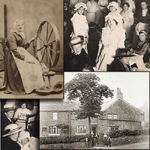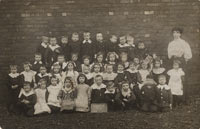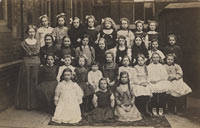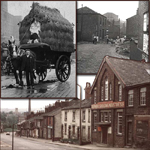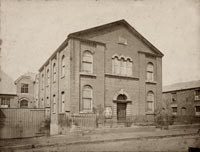
OUR MEMORIES & STORIES Failsworth Wesleyan Day School The two cottages, 'Failswprth View' on Oldham Road in Failsworth, were built in 1840 by Flossie's great-grandfather, Robert Schofield, and five generations of the family have lived there. "I have been told that the rattle of her keys was sufficient to send the assembling scholars rushing to their desks in preparation for morning prayers and the raising of these keys to her lips - one of which would be used as a whistle, ensuring the solemn hush which she demanded as a preliminary to morning devotions. Miss Hoyle turned out some remarkably good scholars. I have met many throughout my lifetime with an excellent knowledge of English. Spelling, in particular, along with handwriting, was of high quality. I have, in my possession, a copy book used by a boy who died at the age of ten years and, even at that early age, his work was showing promise of excellent penmanship. In addition to writing in the copy books they were implanting in their minds proverbs and maxims which taught good manners, honesty, truth and self-discipline which must have contributed to the higher tone which the chapel folk were aspiring to create within the community. Such exhortations were found in the children's copy books as - Honesty is the best policy; A stitch in time saves nine; Pride goes before a fall; Adversity stimulates men to industry; Bacchus had |
|
|
drowned more than Neptune; Confidence is a companion to success; Distraction follows inconsiderate deeds; Education improves good dispositions; Friendship once injured is often lost; Gratitude commands much admiration; hope stimulates men to diligence; immoderate joys terminate in sorrow; Knowledge of ourselves is of importance; Let all your diversions be innocent; Moments of time are for improvement; No monument is equal to virtue; Our education depends upon ourselves; Pride tends to make man unhappy; Questions of moment require thought; Reading tends to enrich the mind; Suspicion haunts the guilty mind; The covetous man is his own tormentor; Useful employment give us pleasure; Vice lives and thrives by concealment; Wanton actions are very unseemly; Youth well-spent leads to a virtuous old age; Zeal without prudence is dangerous. Miss Hoyle identified herself with the church life and the families became known to her as well as the children of the district. After her retirement to Monk Fryston, I can remember her visiting my grandmother. She wore a large black circular hat and peeping underneath was the frilly lace edging of the white cap over which the hat rested. It was then an old-fashioned type of headdress but certainly very becoming. The Wrigley Head Day School was replaced by a new building in 1878 and this must have been a great time for the scholars and staff. Additionally, it provided excellent accommodation for the Sunday School and extra church activities. lt was built attached to the new church erected in1867 and it still stands on a very advantageous site on the main Oldham Road. Failsworth Wesleyan Church was extremely fortunate in the type of people appointed to the Headship of the Day School. My own early schooldays were spent under the Headship of Mr. Ezra Knowles who, with his wife Frances, also a teacher, came to Failsworth in 1906 from Dursley, Gloucestershire. He was a deeply religious man and he immediately identified himself with the Church and Sunday School. Among the church offices he accepted, that of deputy organist, had a far-reaching influence on the the scholars, especially those with good voices and musical aptitude. The Anniversary services of the chapel greatly benefitted by having that strong link between the day and Sunday schools, and the children who were 'sitting-up', as we then described their part of the musical scene, knew there was a discipline which they would be unwise to ignore. In his role as Headmaster individuals had a place. He took a personal interest in his scholars and I am one who can remember, with pleasure, how he would clarify subjects which at first would seem so obscure. At one time I was part of a scholarship class to which he gave unstinting help. The class consisted of two boys and one girl and, to the surprise of all, it was the brightest of the lot who was unsuccessful in the final examination. Years afterwards I met, in Manchester, the other boy, who was by then a successful bank manager and our topic of conversation became 'the eleven plus' which was giving parents and scholars the jitters at that time. He told me when we sat for the scholarship he had not the slightest idea what to expect if he were a success. All he expected to obtain would be some certificate acknowledging the fact, similar to the merit certificates we had been awarded earlier that year. My estimation of the career of the predecessor of Mr. Knowles came to me largely through the correspondence my people maintained with members of H.M.Forces during World War I. It was evident that Mr. Oldershaw was a man who, too, had made a great impression for good on the lives of the children in his care and they frequently testified to this fact in their letters, often asking for news of him and his family as the war proceeded, especially as one or two had come across his son, Eric, during their military training when he was holding a commissioned rank. In my early days at school there were then several older teachers who had also served on the staff of Mr. Oldershaw before his retirement. They were sound and well-trained people who made sure we were well grounded in the three 'Rs' and who not only commanded the respect of the scholars but of the parents also. The end of this relationship, between Day School and Chapel, came in 1913 when the 'Wesleyan' day school ceased to function as a day school and the scholars, along with those from the Swedenborgian Church, merged into a new school, then 'Minor Street', now 'Stansfield Road', with the headships: Miss Smith, Primary; Mr. M. Rydings, Juniors; Mr. Knowles, Seniors. Contributed by Sheila Goodyear |
||
